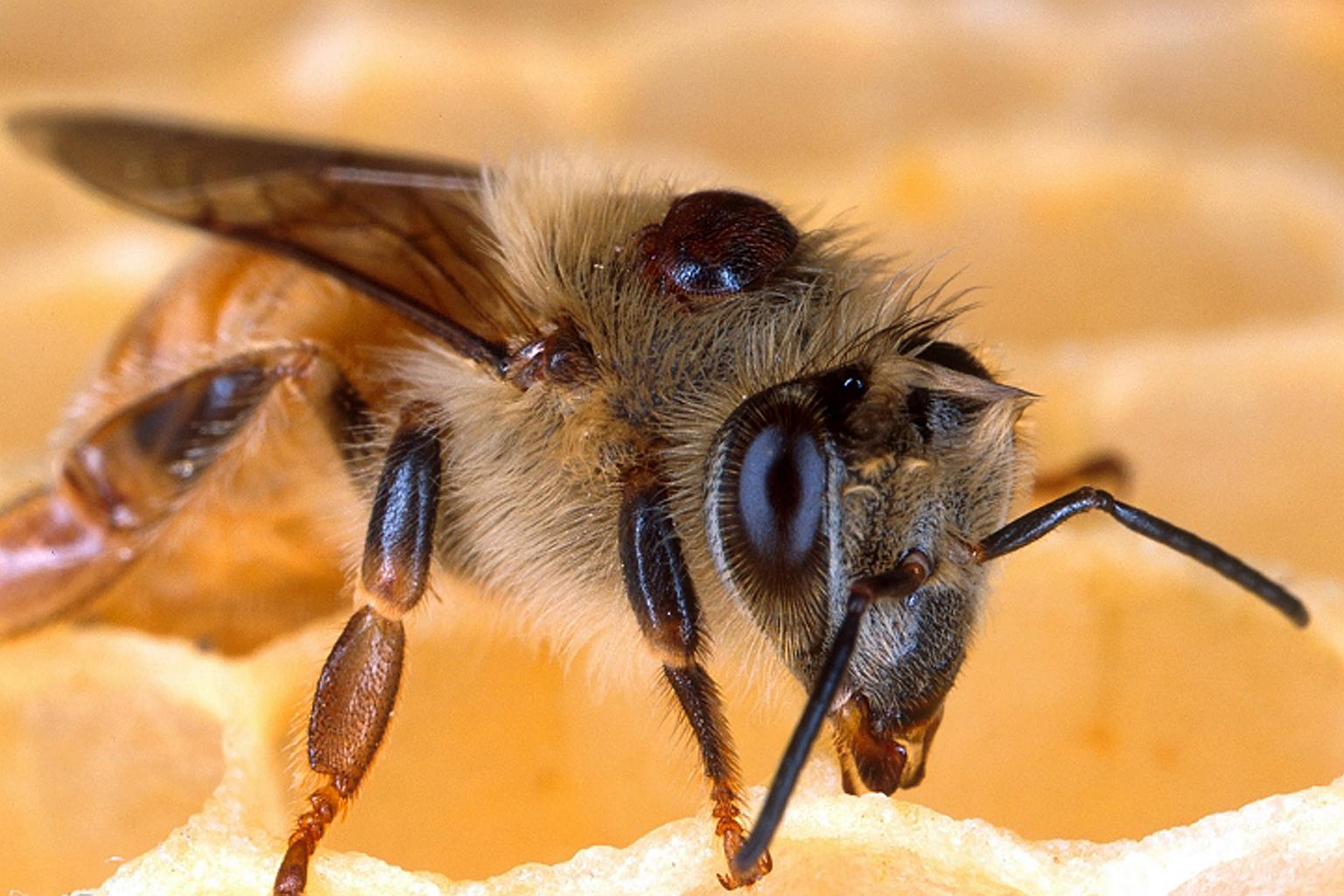Millions of bees killed as Australia races to halt spread of colony-destroying mite
Sign up now: Get insights on Asia's fast-moving developments

A European honey bee with a varroa mite on its back. The mites cause death and disease in bee colonies.
PHOTO: SCOTT BAUER/USDA AGRICULTURAL RESEARCH SERVICE
Follow topic:
SYDNEY - Australia has been forced to destroy millions of bees as it desperately tries to eradicate a spreading infestation of a deadly mite that has been killing honeybees around the world.
The varroa mite was first detected last month at a port in Newcastle, north of Sydney, but it has since been found in bee colonies more than 400km away in other parts of the state of New South Wales (NSW).
The small reddish-brown parasite feeds on bees and can also transmit viruses. Varroa mites are often carried between hives by drone bees, and then they quickly enter and destroy new hives.
The authorities in NSW have destroyed about 1,800 infested hives across the state, killing an estimated 20 million to 60 million bees.
They believe the infestation, if not contained, would cost Australian beekeepers and farmers about A$70 million (S$67.3 million) a year.
Bees are integral to farming in Australia - about a third of food production relies on bee pollination.
Before the current outbreak, Australia was the only continent to remain free of the varroa mite. Mites have been detected previously in the states of Victoria and Queensland, but they were quickly eradicated.
In NSW, the state government imposed a lockdown last month that restricted the movement of hives and barred the removal of honey from them. Hives are often transported to farms, which use them for pollinating crops.
Last week, the government began easing the lockdown, allowing the movement of hives in low-risk areas - a measure that will assist farmers with pollination.
Last Thursday (July 21), the government said it had not detected new infested hives for several days. But there has already been eradication of hives at 40 sites across the state.
Mr Neil Livingstone, a beekeeper in Newcastle, said 10 of his hives were destroyed after they were infested, resulting in the deaths of hundreds of thousands of bees. He warned that failure to eradicate the mites in Australia within the coming weeks could threaten the entire nation's bee population.
"I don't mind doing my little bit and losing my hives for the betterment of Australia, and if that's the attitude that we've all got to take, so be it," he told ABC News.
A federal government report last year said Australia produces about 37,000 tonnes of honey a year. Most of this is consumed domestically, but about 4,000 tonnes a year is exported, primarily to China, the United States, Singapore, Canada and Malaysia.
Honeybees are also crucial for pollinating crops such as almonds, apples, avocados, blueberries and cucumbers.
Following the recent outbreak, the NSW and federal governments introduced an A$18 million compensation package to support affected beekeepers.
The varroa mite is believed to have entered Australia on a ship that docked at Newcastle. To safeguard against the mite and other pests, the authorities keep sentinel hives at major ports that are inspected every six weeks. The mite was found at two sentinel hives at Newcastle's port on June 22.
Dr John Roberts, an expert on bees at Australia's science agency, the Commonwealth Scientific and Industrial Research Organisation, said the permanent presence of the mite in the country would increase the costs of managing healthy hives and make it harder to provide enough hives to meet the demand for pollination.
"Left untreated, varroa mites will eventually kill any bee colony it infests," Dr Roberts said in a report on the agency's website. "Between 90 per cent and 100 per cent of feral colonies are expected to be lost."
In the US, varroa mites have killed the bulk of feral honeybees, but controlled bee hives have also been badly affected.
In New Zealand, the mites have wiped out colonies and caused the feral bee population to drop by about 90 per cent. The losses have reduced pollination and crop yields, leading to heavy costs for the farming sector.

